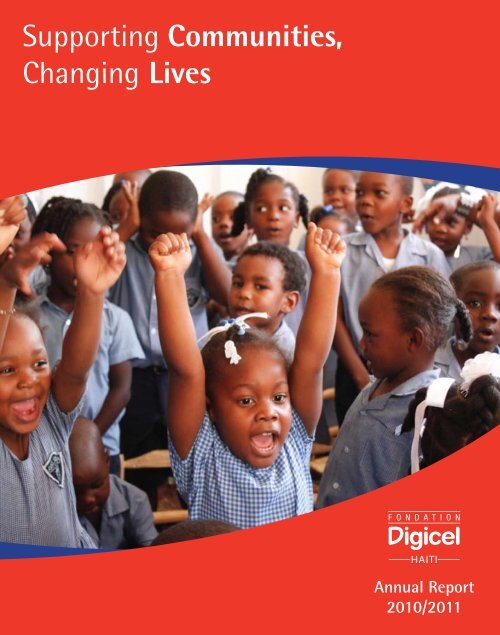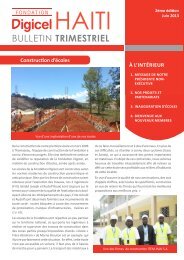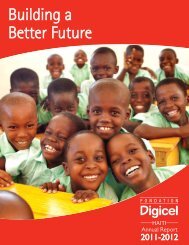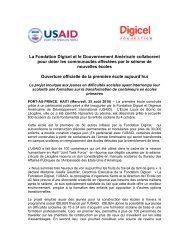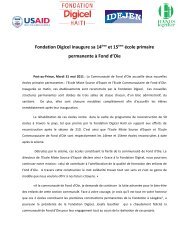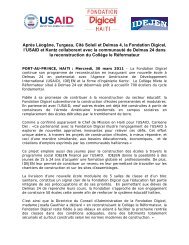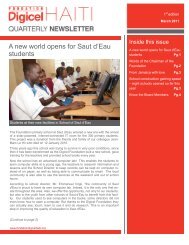Annual Report 2010-2011 (PDF) - Digicel Foundation Haiti
Annual Report 2010-2011 (PDF) - Digicel Foundation Haiti
Annual Report 2010-2011 (PDF) - Digicel Foundation Haiti
You also want an ePaper? Increase the reach of your titles
YUMPU automatically turns print PDFs into web optimized ePapers that Google loves.
Supporting Communities,<br />
Changing Lives<br />
<strong>Annual</strong> <strong>Report</strong><br />
<strong>2010</strong>/<strong>2011</strong>
Supporting Communities<br />
Changing Lives<br />
Fondation <strong>Digicel</strong> <strong>Haiti</strong><br />
151 Angle Av Jean Paul II et Impasse Duverger<br />
Turgeau<br />
Port au Prince<br />
<strong>Haiti</strong> HT6142<br />
www.fondationdigicelhaiti.org<br />
Modular Classrooms, Port au Prince
In <strong>2010</strong>/<strong>2011</strong>...<br />
Number of Direct Beneficiaries: c 44,000<br />
Number of Schools Completed: 13<br />
Invested in Education: $5.4m<br />
Total Grants Given: $2.1m<br />
Number of People Working on School<br />
Construction: 2,000
Patron’s Letter<br />
When we established the <strong>Digicel</strong> <strong>Foundation</strong> <strong>Haiti</strong> four<br />
years ago, we could never have imagined that the<br />
educational and community challenges it was designed<br />
to address could become so much greater, so rapidly.<br />
Indeed, virtually all of the <strong>Foundation</strong>’s work in <strong>2010</strong>/11<br />
was determined by what happened in and around Port au<br />
Prince in just 35 seconds on 12 January <strong>2010</strong>.<br />
The earthquake shattered lives. It took everything from<br />
those who had least. The education sector, in which the<br />
<strong>Foundation</strong> focuses, was amongst the very hardest-hit.<br />
We immediately committed to replacing lost infrastructure<br />
with a $6 million fund to build 50 schools. We also<br />
increased the scope and extent of grant-giving to partners.<br />
As a <strong>Haiti</strong>an organization, whose board is made up of<br />
<strong>Digicel</strong> staff members, the <strong>Foundation</strong> is well-placed to<br />
respond effectively and efficiently to the country’s needs,<br />
to provide support to communities who are working<br />
to improve their lives and futures. The <strong>Foundation</strong> has<br />
continued to pursue this mission resolutely, even amidst<br />
the challenges and obstacles made greater by the<br />
earthquake.<br />
Access to education remains a critical challenge for many<br />
communities in <strong>Haiti</strong>. Many children walk long distances<br />
to attend school in very poor conditions, little better than<br />
shacks. I am pleased to announce that the <strong>Foundation</strong>’s<br />
new target is to construct a further 80 schools, all over the<br />
country. This will bring the number of <strong>Digicel</strong> <strong>Foundation</strong><br />
schools built to 150 by 2013, providing a good educational<br />
environment for approximately 40,000 children each year.<br />
By supporting teachers and schools to deliver better<br />
education, we hope to improve the future for the country<br />
as a whole, resulting in a safer, more prosperous, more<br />
equal society. <strong>Haiti</strong> deserves nothing less.<br />
I want to pay tribute to Josefa Gauthier and the Board<br />
Members and staff of the <strong>Foundation</strong>, many of whom<br />
suffered personal losses in the earthquake, but who<br />
fully committed themselves to helping <strong>Haiti</strong> to build<br />
back better. I particularly want to congratulate Josefa<br />
on her new role as Chairman of the <strong>Haiti</strong> <strong>Foundation</strong>, in<br />
recognition of her pivotal role in the establishment and<br />
development of the <strong>Foundation</strong> since its inception in 2007.<br />
Denis O’Brien<br />
Founder<br />
3<br />
The <strong>Foundation</strong>’s programme is not an add-on to <strong>Digicel</strong> in<br />
<strong>Haiti</strong> – it is at the core of what the company is about. The<br />
<strong>Digicel</strong> <strong>Foundation</strong> focuses on the positives already in <strong>Haiti</strong><br />
– the strength of its communities, the resourcefulness of<br />
its people, the potential of its children.
Where We Work<br />
Each of the three countries the <strong>Foundation</strong> works in are in<br />
the bottom half of the United Nations Human Development<br />
Index. This index names 169 countries and combines the<br />
three dimensions of human development – living a long<br />
healthy life, being educated and having a decent standard<br />
of living.<br />
While the cultural, historic and socioeconomic conditions of<br />
each country are varied, they have in common significant<br />
challenges for their education systems; a need for building<br />
stronger communities to offset potential conflicts; and<br />
vulnerability to natural disasters. The <strong>Foundation</strong> seeks to<br />
find relevant and effective responses to these challenges and<br />
to support and strengthen communities to withstand them.<br />
4
The <strong>Foundation</strong> has shown that by<br />
investing in schools and teachers, even in<br />
the most disadvantaged areas, change<br />
for the better will happen<br />
Saut d’Eau 2007<br />
Saut d’Eau IT Lab <strong>2011</strong><br />
Clean Energy Store
Chairman’s Statement<br />
The <strong>Digicel</strong> <strong>Foundation</strong> believes that education is the<br />
answer to so many of <strong>Haiti</strong>’s problems – an educated<br />
population is more able to be economically active and<br />
productive, to protect their health and that of their<br />
children, to assert their rights. The statistics in <strong>Haiti</strong> are<br />
lamentable: almost one in two children do not have the<br />
opportunity to attend school, when they do it is for an<br />
average of about five years, and often they are taught by<br />
untrained – and unpaid – teachers.<br />
Since the earthquake, we are pleased that so many<br />
organizations are now focusing on ways to improve<br />
education in <strong>Haiti</strong> and to implement the government’s<br />
strategy. The <strong>Foundation</strong> has shown that by investing in<br />
schools and teachers, even in the most disadvantaged<br />
areas, change for the better will happen. In just two years,<br />
42% more children are passing the primary certificate in<br />
the <strong>Foundation</strong> schools.<br />
We believe in the power of partnerships, and one positive<br />
to have emerged from the disaster of 12 January <strong>2010</strong> is<br />
the new connections we have made and relationships we<br />
have built with organizations and individuals who share<br />
our mission and vision for a better <strong>Haiti</strong>. We hope that<br />
these new linkages will grow and strengthen in years to<br />
come. I want to thank all those who supported us in our<br />
time of greatest need, too many to name, but particularly<br />
Kentz Engineering who provided two highly-experienced<br />
construction project managers to the <strong>Foundation</strong> free of<br />
charge for the year and United Way Trinidad & Tobago<br />
who have funded the construction of one of the schools.<br />
We and all who benefit from our work are enormously<br />
grateful to Denis O’Brien and to <strong>Digicel</strong> for their unstinting<br />
and generous support to <strong>Haiti</strong> which goes far beyond the<br />
professional.<br />
I also wish to thank those board members who completed<br />
their service to the <strong>Foundation</strong> during the year – Yolande<br />
Chavenet, Monique Decrumpe-Antoine, Nathalie Etienne,<br />
Murielle Gardere, Bryan Gonzales, Jimps Jerome, Ian<br />
Jones, Fiona McGloin, Luigi Roy and Isabelle Valme and<br />
to welcome our new members Maarten Boute, Vanessa<br />
Legros, Mark McGrath, Louidjy Nazaire and Sandra Pierre.<br />
We look forward to working together as we expand our<br />
construction programme to build a further 80 schools in<br />
the next two years.<br />
Josefa Gauthier<br />
Chairman<br />
6
Year in Review<br />
7<br />
The education system in <strong>Haiti</strong> was hard-hit by the<br />
earthquake of 12 January <strong>2010</strong>. Ministry of Education<br />
figures show that 85% of schools in the Ouest region were<br />
damaged or destroyed, and as many as 38,000 people lost<br />
their lives in educational establishments that afternoon.<br />
Schools all over <strong>Haiti</strong> remained shut until 5 April <strong>2010</strong>,<br />
and many in rural areas were affected by an influx of new<br />
students whose families had moved out of Port au Prince.<br />
In many of the <strong>Foundation</strong> schools, enrollment increased<br />
by 10% or more.<br />
The pressure on and disruption to family incomes after<br />
the earthquake meant that schools struggled to stay open.<br />
Many reopened under tarpaulins and in tents. At the same<br />
time, many children were desperate to return to school,<br />
craving the routine, time with their friends, a return to<br />
normality where they could distract themselves for a<br />
few hours from the chaos and hardship the earthquake<br />
inflicted on their lives.<br />
The <strong>Foundation</strong> sought to help address these issues<br />
through a mix of direct and indirect supports: a new<br />
school construction programme, by making school<br />
furniture and materials available to 47 other schools and<br />
an expanded grant-giving programme.<br />
School Construction<br />
The <strong>Foundation</strong> was tasked by founder Denis O’Brien with<br />
building 50 schools, to replace infrastructure lost in the<br />
earthquake, but also to continue to address the needs in<br />
rural areas.<br />
The <strong>Foundation</strong>’s approach is to provide a complete<br />
school solution, comprising six classrooms, an office for<br />
administration and sanitation in line with the Ministry’s<br />
new standards, and all paraseismically designed and<br />
engineered. The schools are also fully furnished by the<br />
<strong>Foundation</strong> and one-third of classrooms are wheelchair<br />
accessible. This allows staff and students to concentrate<br />
on teaching and learning from the day that the new<br />
school opens.<br />
Andre Jean, Principal of College Classique, Port du Prince,<br />
by his destroyed school<br />
Each school site is visited to assess the appropriate<br />
construction method and school layout, but critically also<br />
to evaluate the school’s organization and management.<br />
During the year approximately 65 schools were assessed<br />
and evaluated. The <strong>Foundation</strong> is open to public, private,<br />
religious or community schools, of various sizes, mostly<br />
in the primary sector, but it does require that the school<br />
returned to operations after the earthquake and that it is<br />
in a position to operate successfully into the future. The<br />
school must have clear land ownership as well as evidence<br />
of its interaction with the Ministry of Education.<br />
The construction programme started more slowly than<br />
desired for two main reasons: the need to identify sites<br />
which had already been cleared of rubble and the need<br />
to wait for the new school construction standards to be<br />
developed by the Ministry of Education, which became<br />
available in November <strong>2010</strong>.
Picture: JERRY KENNELLY<br />
Soul of <strong>Haiti</strong><br />
The <strong>Foundation</strong> developed a transitional school solution,<br />
modifying 20 foot long steel shipping containers to<br />
provide paraseismic classrooms which have a lifespan of<br />
up to 10 years. A partnership was formed with USAID and<br />
Idejen, the <strong>Haiti</strong>an youth training organization. USAID<br />
donated 182 containers which had been used to bring<br />
humanitarian relief to <strong>Haiti</strong> as part of the US military’s<br />
post-earthquake efforts, and Idejen provided land as well<br />
as workers to set up a fabrication site. Irish engineering<br />
firm Kentz donated two full-time, highly experienced<br />
construction managers to the project.<br />
The first complete modular school was launched at<br />
Léogâne, which was the epicentre of the earthquake, in<br />
August <strong>2010</strong>. These schools have been very popular with<br />
students and teachers because they feel so secure inside<br />
them. Some children were too afraid to return to masonry<br />
buildings after the earthquake, and refused to return to<br />
school, but have happily rejoined class in the modular<br />
schools. At every school launch, parents talked about how<br />
relieved they were to know their children were at class in<br />
a safe structure. The classrooms were deliberately painted<br />
in bright, primary, child-friendly colours, again chosen to<br />
encourage students to return.<br />
The permanent schools were designed by a structural<br />
engineer and fully seismically tested. The <strong>Foundation</strong><br />
provides support and supervision to contractors to ensure<br />
that the plans are being correctly followed. The schools<br />
include one in association with Special Olympics to deliver<br />
education to children with special needs, two on an<br />
island off the south coast, and one in a camp of displaced<br />
persons. Most schools are completed within four months<br />
of construction starting.<br />
Within seven months, by the end of March, the <strong>Foundation</strong><br />
had completed 11 modular and two permanent schools,<br />
providing accommodation for more than 3,000 students.<br />
Progress at some sites was complicated by adverse<br />
weather in the wake of Hurricane Thomas in November<br />
<strong>2010</strong> as well as the impact of the protests after the<br />
election results in December <strong>2010</strong>. The remaining 37 will<br />
be completed in October <strong>2011</strong>. Seven of these schools are<br />
being constructed in the Central Plateau by Partners in<br />
Health, a long-standing partner of the <strong>Digicel</strong> <strong>Foundation</strong>,<br />
and another is being built in Saut d’Eau by Concern.<br />
Educational Quality Improvement<br />
Programme<br />
The three-year programme to support the first 20 schools<br />
constructed by the <strong>Foundation</strong> in 2007/8 continued with<br />
only minor delays. The School Directors underwent further<br />
management training, enhancing their skills in human<br />
resources, finance and budgeting. 124 teachers attended<br />
the summer residential training programme. The schools<br />
were provided with school books, as well as a stipend to<br />
support teachers’ incomes.<br />
Classroom interior for the modular classes<br />
Each school was visited and formally evaluated as part<br />
of the School of the Year Award programme, which was<br />
won by College Moderne of Marbiale. Most schools are<br />
progressing extremely well, even in face of the challenges<br />
brought about by the earthquake. In two years, there has<br />
been a 42% increase in the number of children passing the<br />
primary certificate.<br />
8
focusing on ways to<br />
improve education in <strong>Haiti</strong><br />
Student in Modular Classroom<br />
Teachers at the School of the Year Award<br />
Book Distribution
Thanks to a generous donation from the family and friends<br />
of Jean-Marc Le Hir, a <strong>Digicel</strong> colleague who died on<br />
12 January <strong>2010</strong>, the <strong>Foundation</strong> with partners Inveneo<br />
installed a solar-powered IT lab in Ecole St Claire at Saut<br />
d’Eau, with broadband internet access. This has proven<br />
successful to date, with teachers and students benefitting<br />
greatly from the new resources, and the facility is also<br />
available to the community outside of school hours.<br />
As in previous years, Christmas parties were organized at<br />
three schools – at Béraud, Déron and Jérémie – where a<br />
special visit from Santa Claus was the highlight for the<br />
hundreds of children, each of whom received a personal gift.<br />
Education remains a focus of our grant programme.<br />
<strong>Haiti</strong> has 45,000 unqualified teachers working in primary<br />
schools. The <strong>Foundation</strong> provided seed funding for the<br />
establishment of the National Institute for Teacher<br />
Education, which is designing programmes for in-service<br />
training using a combination of tutor groups and online<br />
components and which has worked very successfully<br />
in other countries. Through the <strong>Haiti</strong>an Education &<br />
Leadership Programme we also provided a university<br />
scholarship for a student of education at Quisqueya<br />
University. The <strong>Foundation</strong> gave furniture and materials to<br />
assist 9,120 students.<br />
Shelter and housing became hugely critical issues in<br />
<strong>Haiti</strong> with one million people left homeless after the<br />
earthquake. The <strong>Foundation</strong> made large donations to the<br />
Haven Partnership for its new permanent community at<br />
Gonaïves, including a community centre which can be<br />
used for educational purposes. A further large grant was<br />
provided to Un Techo para mi Pais to provide 50 mediumterm<br />
transitional shelters to families living in tents on the<br />
outskirts of Port au Prince. Finally, funding to build three<br />
permanent homes for families affected by disability who<br />
lost their houses was donated to Nos Petits Frères et Soeurs.<br />
Scouts rescue and recovery training<br />
Grant Giving<br />
The <strong>Digicel</strong> <strong>Foundation</strong> <strong>Haiti</strong> runs and manages its own<br />
programmes directly, but also provides financial support<br />
to third-parties. Thanks to the greatly increased resources<br />
of the <strong>Foundation</strong>, the activities funded by the <strong>Foundation</strong><br />
during the year were varied and wide-ranging.<br />
Transitional house<br />
10
Picture: JERRY KENNELLY<br />
The unimaginable trauma and loss suffered by the whole<br />
population of Port au Prince has been too great for many<br />
to bear. There is a huge need for mental health services and<br />
psychosocial support over the long-term. The <strong>Foundation</strong><br />
has funded Partners in Health with New York University to<br />
prepare a programme to train community health workers<br />
to identify and assist those in distress and suffering<br />
mental illness, including work on the cultural context and<br />
understanding of mental health in <strong>Haiti</strong>. The programme has<br />
also engaged with traditional healers. Since the earthquake,<br />
Partners in Health services have received over 20,000 mental<br />
health visits. The <strong>Foundation</strong> also assisted Partners in Health<br />
in bringing patients in need of sophisticated surgical and<br />
medical treatment to the United States through its ‘Right to<br />
Healthcare’ programme.<br />
Strengthening communities and supporting the youth is a<br />
core value of the <strong>Foundation</strong> and a new two-year programme<br />
of support was entered into with the National Association of<br />
Scouts of <strong>Haiti</strong>. This grant will train 138 trainers in first aid and<br />
emergency responses. Over time all 45,000 Scouts will have<br />
received this training, and be able to help their communities<br />
in the event of disasters such as hurricanes, flooding or<br />
earthquake. This is of enormous benefit in <strong>Haiti</strong> where many<br />
communities are remote and isolated from the very limited<br />
emergency services which exist.<br />
<strong>Digicel</strong> is a major supporter of the Special Olympics<br />
movement all over the Caribbean and a two-year grant was<br />
agreed with Special Olympics <strong>Haiti</strong> to provide equipment and<br />
training for up to 300 athletes.<br />
One of the major challenges <strong>Haiti</strong> faces is the overwhelmingly<br />
negative perception of the country internationally. This<br />
impedes economic development through discouraging foreign<br />
direct investment and tourism. The <strong>Foundation</strong> provided<br />
establishment funding to Soul of <strong>Haiti</strong> for the Brand <strong>Haiti</strong><br />
initiative, designed to rebuild national pride and to correct<br />
the perception of the country internationally. Brand <strong>Haiti</strong><br />
includes representatives of the key <strong>Haiti</strong>an private sector<br />
organizations, and works closely with government. During<br />
the year it carried out focus groups with 300 stakeholders<br />
to develop the brand proposition. Additionally, an image<br />
bank of 2,000 photographs with positive portrayals of <strong>Haiti</strong><br />
was created.The <strong>Foundation</strong> was also able to provide small<br />
but important grants to the Ministry of Culture to enable 14<br />
artisans whose studios were destroyed in the earthquake to<br />
get back to production, and to EarthSpark International for<br />
their first clean energy store in Les Anglais which is employing<br />
eight people and provides access to clean cooking stoves and<br />
solar lights to the community.<br />
11
Looking Forward<br />
Building safe, quality educational environments remains<br />
the <strong>Foundation</strong>’s focus into <strong>2011</strong>/12, with the school<br />
construction programme continuing apace. The programme<br />
will be expanded to a further 80 schools by September<br />
2013. The organization continues to grow and develop,<br />
working closely with the state and other partners to deliver<br />
cost-effective school infrastructure so that teachers and<br />
students can get on with what matters – the sharing and<br />
love of knowledge and education. We also look forward<br />
to continuing to support our partners in fulfilling their<br />
missions and to finding new community projects that will<br />
make a difference for years ahead.<br />
Board Members<br />
Marckens Armony<br />
Maarten Boute<br />
Josefa Gauthier<br />
Executive Chairman<br />
Elizabeth Headon<br />
Chief Executive<br />
Vanessa Legros<br />
Mark McGrath<br />
Louidjy Nazaire<br />
Sandra Pierre<br />
Evelyn Théard<br />
12
Donors<br />
• <strong>Digicel</strong><br />
• Andrew Grene <strong>Foundation</strong><br />
• Kentz Engineering<br />
• Neal & Massy <strong>Foundation</strong><br />
• United Way Trinidad & Tobago<br />
• Family of Jean Marc Le Hir<br />
Partners<br />
• BRAC<br />
• Concern<br />
• Hands Together<br />
• Haven Partnership<br />
• HP/Urgence<br />
• Idejen<br />
• Inveneo<br />
• Jesuits<br />
• Mayor of Port au Prince<br />
• National Institute for<br />
Teacher Education<br />
• Outreach International<br />
• Partners in Health<br />
• ProDev<br />
• Rescue One Child<br />
• Sisters of Cluny<br />
• Soul of <strong>Haiti</strong><br />
• Sovelavi<br />
• Special Olympics<br />
• Un techo para mi país<br />
• USAID<br />
T M
<strong>Digicel</strong> Haïti <strong>Foundation</strong><br />
Financial Statements<br />
March 31, <strong>2011</strong> and <strong>2010</strong><br />
(With Independent Auditors’ <strong>Report</strong> Thereon)
<strong>Digicel</strong> Haïti <strong>Foundation</strong><br />
Balance Sheets<br />
March 31, <strong>2011</strong> and <strong>2010</strong><br />
(Expressed in US dollars)<br />
<strong>2011</strong> <strong>2010</strong><br />
CURRENT ASSETS<br />
Cash and cash equivalents $ 4,692,844 611,285<br />
Advances to employees 23,685 7,033<br />
Accounts receivable 5,240 -<br />
4,721,769 618,318<br />
CURRENT LIABILITIES AND NET ASSETS<br />
Creditors 790,603 253,020<br />
Intercompany payable 17,888 9,701<br />
808,491 262,721<br />
NET ASSETS<br />
Fund balance 3,964,586 347,836<br />
Translation adjustment (51,308) 7,761<br />
3,913,278 355,597<br />
$ 4,721,769 618,318<br />
17
<strong>Digicel</strong> Haïti <strong>Foundation</strong><br />
Statements of Income and Expenses<br />
Years ended March 31, <strong>2011</strong> and <strong>2010</strong><br />
(Expressed in US dollars)<br />
<strong>2011</strong> <strong>2010</strong><br />
INCOME<br />
CONTRIBUTIONS:<br />
Cash contributions - Unigestion Holding S.A. $ 5,986,172 2,513,943<br />
Cash contributions - <strong>Digicel</strong> Group 5,822,345 -<br />
Cash contributions - others 187,230 355,689<br />
Non cash contributions - rent 54,744 54,744<br />
12,050,491 2,924,376<br />
OTHER INCOME:<br />
Foreign exchange gain (loss) 50,506 (18,317)<br />
TOTAL INCOME 12,100,997 2,906,059<br />
EXPENSES<br />
FUNDING OF PROJECTS 8,160,501 2,387,227<br />
ADMINISTRATIVE EXPENSES:<br />
Salaries and employees benefits 186,812 134,587<br />
Rent 54,744 54,744<br />
Travel 36,558 53,255<br />
Marketing expenses 15,020 -<br />
Professional fees 14,037 10,396<br />
Other expenses 16,575 4,375<br />
323,746 257,357<br />
TOTAL EXPENSES 8,484,247 2,644,584<br />
Surplus of income over expenses $ 3,616,750 261,475<br />
18
<strong>Digicel</strong> Haïti <strong>Foundation</strong><br />
Statements of Cash Flows<br />
Years ended March 31, <strong>2011</strong> and <strong>2010</strong><br />
(Expressed in US dollars)<br />
<strong>2011</strong> <strong>2010</strong><br />
OPERATING ACTIVITIES<br />
Surplus of income over expenses $ 3,616,750 261,475<br />
Adjustments to determine net cash flows<br />
provided by operating activities:<br />
Translation adjustment (59,069) 9,462<br />
Net changes in current assets<br />
And current liabilities:<br />
Increase in advances to employees (16,652) (2,803)<br />
Increase in accounts receivable (5,240) -<br />
Increase in creditors 537,583 49,151<br />
Increase in intercompany payable 8,187 9,701<br />
Net cash flows provided by operating activities 4,081,559 326,986<br />
Cash and cash equivalents at beginning of year 606,430 285,144<br />
Effect of foreign exchange in cash and<br />
cash equivalents at beginning of year 4,855 (845)<br />
Cash and cash equivalents at end of year $ 4,692,844 611,285<br />
19


